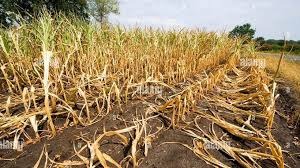Climate Change Poses a Growing Threat to Agricultural Sustainability in Chiredzi

By Thomas Madhuku
CHIREDZI- Agriculture experts are sounding the alarm in Chiredzi, urging farmers to proactively engage with crop calendars to mitigate the adverse effects of climate change, which have significantly impacted the country’s food production capacity.
Annatoria Kumbula, a seasoned farmer in Chiredzi’s Malipati area, has witnessed a consistent decline in her yield over the seasons, often attributing it to poor seed quality. Despite experimenting with various types of manure and seed varieties in the hope of improving her harvest, Kumbula’s efforts have not translated into better fortunes.
Last year, Kumbula adopted a strategy of planting maize after every rain to diversify her risk, but the gamble did not yield the expected benefits. Her struggle is mirrored by many other farmers in Chiredzi and neighboring areas within Natural Farming Region Five, all grappling with the challenges posed by climate change.
Rural livelihoods in these regions have become increasingly difficult without reliable cereal crops, necessitating the urgent implementation of long-term solutions to combat a problem that climate change experts predict will only worsen with time.
A Chiredzi farmer, Herbert Madhobhi said climate change has left him struggling to support his 20 member family as he has for the past four seasons failed to harvest enough food.
“I used to harvest over 10 tonnes of maize, three tonnes of sorghum and 10 bags of rapoko which was enough to feed my family for the whole year. Now i have not been able to harvest enough because my yield is less than half of what i used to get,” said Madhobhi.
He added that sometimes he misses on the perfect rain to plant his crops which results in less or no harvest.
Another farmer from Chikombezi, Rosemary Mubi said she is planning to move away from farming and wants to start a business which she hopes would raise enough money to feed her family.
“After years of investing so much and getting so little, I am seriously contemplating moving away from farming, i am would rather invest that money in a business and survive from the profits,” said Mubi.
Zebron Mkwananzi, a prominent agronomist based in Chiredzi, stressed the importance of farmers studying crop calendars to counteract the effects of climate change and secure a good yield despite changing weather patterns.
In an interview, Mkwananzi highlighted the broader implications of climate change on food and water security, emphasizing the need for adaptation to survive the ongoing crisis.
“In Zimbabwe, climate change has intensified hardships and poverty, particularly within the agricultural sector, which contributes 17% to the nation’s economy and provides sustenance for its citizens,” explained Mkwananzi.
The economic impact of climate change on Zimbabwe is profound. The agricultural sector, heavily dependent on water availability, experiences fluctuations in the gross domestic product (GDP) based on rainfall patterns. Adequate rainfall leads to increased GDP, while erratic rainfalls result in economic downturns.
Desire Mulambo, a Masvingo based advocate for climate change awareness, emphasized the urgency of addressing the issue to enhance environmental care and agricultural sustainability.
According to Mulambo, educating farmers on crop calendars is essential for countering climate change, improving yields, and fostering economic growth through agriculture.
“Climate change demands attention from farmers and citizens alike. Raising awareness on environmental care and climate change will not only protect our planet but also strengthen the agricultural sector, ultimately boosting the economy,” said Mulambo.
As Chiredzi grapples with the immediate challenges posed by climate change, the call for collective action and sustainable farming practices becomes ever more critical to secure a resilient and prosperous agricultural future.




